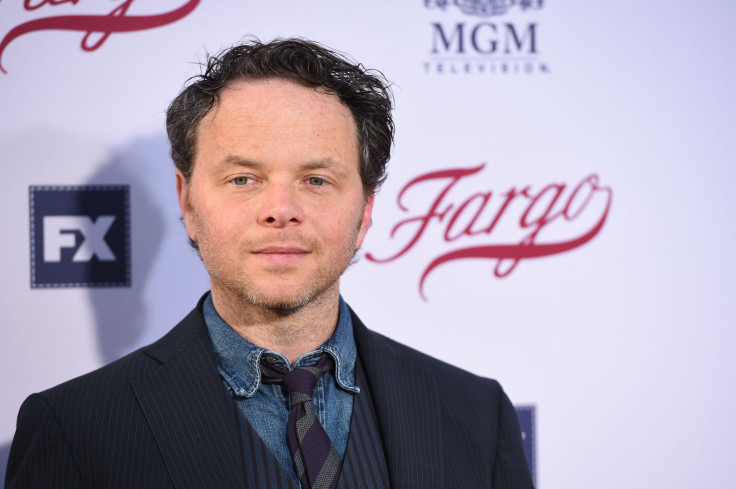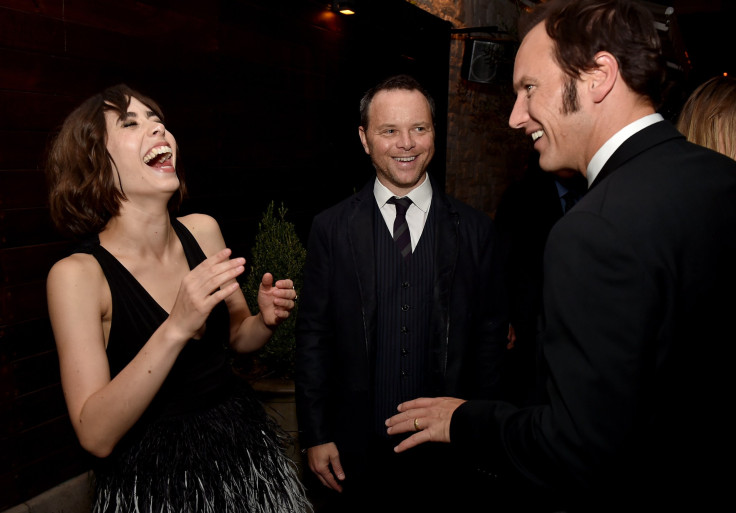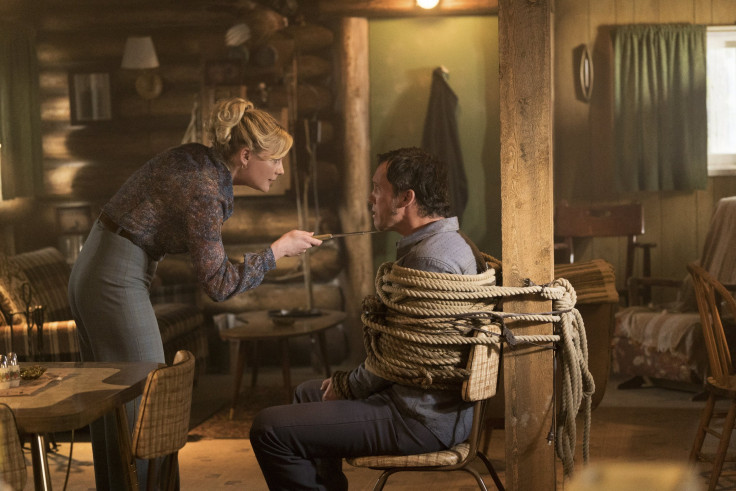Meet Noah Hawley: ‘Fargo’ Showrunner And FX’s Insanely Productive Power Producer

Noah Hawley is an unassuming sort of guy, the kind of middle-aged white dude you pass in the grocery store without a second glance. He has two little kids in tow, the eyes of someone sleep-deprived — who isn't these days? — a shirt collar slightly torn (or maybe it's supposed to look that way) and sometimes glasses.
To look at him, you might not guess he's one of the most in-demand writers of the day. Books, TV series, movies — you name it, Hawley is doing it.
His fifth novel, "Before the Fall," just hit stores on Tuesday, to rave reviews; in April, he inked a film deal with the 20th Century Fox studio; and he'll be directing his first movie, a sci-fi joint called "Man Alive," in the near future.
And he's one of the crown jewels in FX's stable of high-profile hitmakers. He has two shows in production at the network — "Fargo" and "Legion" — and three others in development.
"In L.A., they call you a 'pod' if you have more than one show," Hawley, 49, notes, somewhat self-deprecatingly. "It's very weird."
Hawley himself lives in Austin, Texas, with his wife and two young children. "Fargo" shoots in Calgary; "Legion," in Vancouver. He spends a lot of time on planes, but that gives him time to read and "refill the well," as he puts it — restock all those ideas. The last book he read was Carlo Rovelli's nonfiction "Seven Brief Lessons on Physics."
Hawley's upward trajectory started with "Fargo," which in 2014 turned him from just another talented writer into the man who did the impossible: He adapted the Coen brothers' 1996 classic movie into a TV series that simultaneously did justice to the film while feeling like its own animal. The Coens themselves deemed it "good," and agreed to the use of their name in the credits.
Hawley and producer Warren Littlefield, who headed NBC during the "Must See TV" days, had worked together before on various projects, and when Littlefield decided the time was ripe for another attempt to bring "Fargo" to the small screen, he knew exactly the person to go to.
"I read his fourth novel, 'The Good Father,' and thought, oh my God. Noah. 'Fargo.' It became my quest," Littlefield said in an interview shortly before "Fargo" premiered. "I just really believed in Noah's voice and what he could do as an artist."
Though hardly a ratings juggernaut — what is, lately? — FX's "Fargo" did well enough in its first season (2014) to warrant the ordering of second and third installments. Season 2 aired in fall of 2015. Season 3 is set to air sometime in 2017.
Besides, FX is a network where hardware matters almost as much as ratings, and the first season of "Fargo" cleaned up at awards shows for its first season with three Emmy wins, including one for Outstanding Miniseries. (The show is what FX Networks CEO John Landgraf calls an "anthological miniseries," where the cast and story change each season, but the creative team remains intact.)
The second season, a darkly funny, brutal meditation on the corporatization of small-town America through the lens of organized crime, starring Ted Danson, Kirsten Dunst and Patrick Wilson, is drawing even more awards-show heat, and has the highest score of any current TV show on review aggregation site Metacritic.

On Tuesday, FX officially added another show to Hawley's plate by picking up "Legion," a Marvel co-production that draws from the X-Men universe. FX is owned by 21st Century Fox, which owns the rights to X-Men, and so the network had been looking for a way to get in on that sweet, sweet comic-book action that has the rest of Hollywood seeing dollar signs. "The question for us was, how do we subvert this genre?" says Eric Schrier, president of original programming at the network. "What's the FX version of an X-Men show?"
After seeing what Hawley had done with one beloved franchise, Schrier and Landgraf knew who could answer that question. For Hawley's part, he'd been reading X-Men comics since childhood, though he didn't want to tell any stories that already existed in the comic books. "This is it, right? This is the story of our age," he says. "There's this need, for whatever reason, to tell these superhero stories to ourselves."
Hawley's take centers on a man (Dan Stevens of "Downton Abbey") whose schizophrenia might actually be something else, given that he's the son of an X-Men leader.
"These stories tend to be all verbs," Hawley says. "I like to play around with it more. Explore the more philosophical or existential side of it. Have more whimsy to it, be a little more surreal." He pauses. "That's a word I find myself using a lot."
But anyway the idea is that if you have a main character who isn't sure if the things he's seeing and hearing are real, "the audience should be experiencing that as well," Hawley explains.
His other three shows in development with the network included a limited series adaptation of Kurt Vonnegut's "Cat's Cradle." Although "Cat's Cradle" hasn't been officially picked up, network sources say Hawley has achieved that rarest of statuses where a series pickup is essentially a foregone conclusion, simply because he's involved. "We were like, 'This guy's the real deal,'" Schrier says.
Aside from "real deal," words like "auteur" get tossed around a lot with showrunners like Hawley and Nic Pizzolatto (of HBO's anthological miniseries "True Detective"), who have a singular vision for the show and take on production duties in addition to writing.
Hawley and Pizzolatto's shows were even set up as rivals of a kind in their first seasons, partly because of the surface similarities: Created by novelists writing for TV; limited series; murder in a landscape foreign to most Americans (the tundra of Minnesota, the bayou of Louisiana); movie actors doing TV (Billy Bob Thornton in "Fargo," Woody Harrelson and Matthew McConaughey in "True Detective"). FX had even taken part in the bidding war for "True Detective."
But "True Detective," unlike "Fargo," suffered from a sophomore slump so severe HBO and Pizzolatto aren't planning on making another season. The third season of "Fargo" is still being written and cast, so it's hard to say if Hawley will complete the hat trick, but it sounds promising: Ewan McGregor playing two brothers, one of whom is referred to as the "Parking Lot King of Minnesota." (There's that whimsy.)

Where Hawley went right was in embracing a writers' room. "The reason you have a writers' room is so you have a room of people dedicated to thinking about that one thing," he says. That allows him a little breathing room, a little more time to edit or direct or compose — all things he does for his shows — or dash off a chapter in another novel.
Not that he shunts off all the thinking to his writers' rooms. "I do make these shows by hand, for lack of a better analogy," he adds. It's the kind of phrase that reads pretentious, but doesn't sound it. What it means is he's meticulous — on the first season of "Fargo," he even chose the extras for scenes.
That kind of "good enough isn't good enough" attitude can sometimes make for blown budgets and production schedules, i.e., a real headache for a network. But Schrier says Hawley manages to find the balance: "He's an adult."
What helps is that Hawley wasn't by any means a TV newbie when he took the reins for "Fargo." In the early 2000s, after getting some bites on some pilots he'd written, Hawley realized if the time ever came when he got a true series green light, he'd have no idea how to actually run a show. So when Hart Hanson, the showrunner for Fox procedural "Bones," offered him a gig as a story editor, he jumped at the chance.
The show wasn't exactly Hawley's style, but that wasn't exactly what Hawley was looking to hone, anyway. "Hart said, 'Look, you'll learn how to produce on this show,' and that was what was important to me," he says. In 2009, he put those lessons to use a showrunner on a half-season wonder on ABC, "The Unusuals."
"Television teaches you to be creative at the barrel of a gun," Hawley says. "If you've got two hours to rewrite a script, there's no muse. You just have to rewrite the script. It's a job. And the artistry is in being your best self in the time allotted." Knowing that balance is one of the most important qualities in a showrunner — or any TV writer.
Interestingly, when Hawley describes the most important quality for a showrunner, the word "leader" doesn't actually pass his lips, perhaps because it's become such a cliché.
Instead, he says, "You have to be that person who says, 'We're going over the hill! We're gonna take the city!'" He shakes an invisible spear. "'It's gonna be great! There'll be snacks!'"
© Copyright IBTimes 2024. All rights reserved.






















